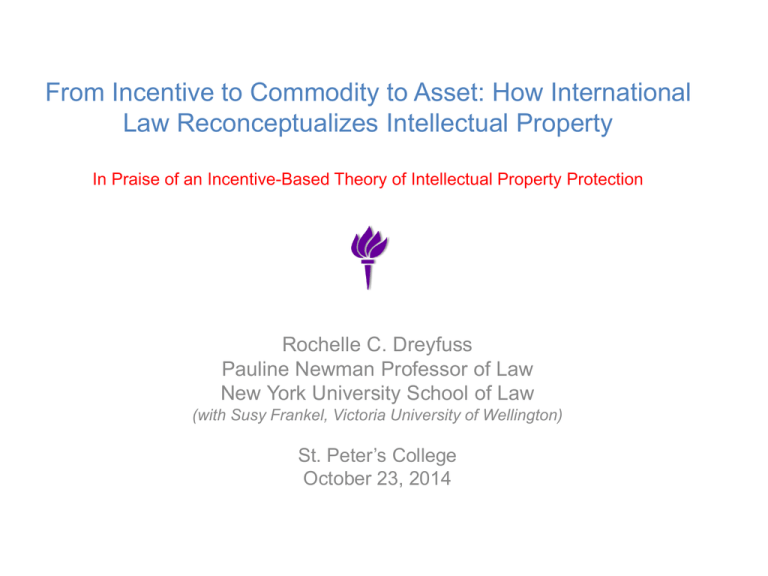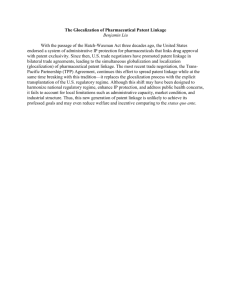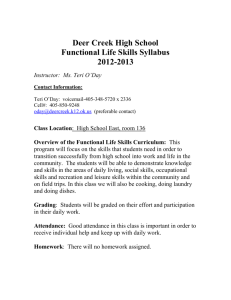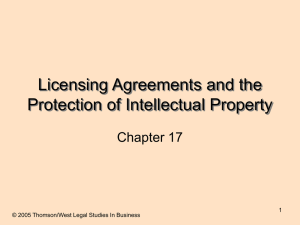From Incentive to Commodity to Asset: How International Law is
advertisement

From Incentive to Commodity to Asset: How International Law Reconceptualizes Intellectual Property In Praise of an Incentive-Based Theory of Intellectual Property Protection Rochelle C. Dreyfuss Pauline Newman Professor of Law New York University School of Law (with Susy Frankel, Victoria University of Wellington) St. Peter’s College October 23, 2014 The Free Ride Linkage and the reconceptualization of IP • Linkage to trade (TRIPS): commodification - right to choose where to make, where to sell e.g. TRIPS art. 27: patents shall be available and patent rights enjoyable without discrimination as to . . . whether products are imported or locally produced. - most-favoured-nation provision (ratchet up) TRIPS art. 4: … any advantage, favour, privilege or immunity granted by a Member to the nationals of any other country shall be accorded immediately and unconditionally to the nationals of all other Members. - exceptions provisions strictly interpreted e.g. TRIPS art. 30: Members may provide limited exceptions to the exclusive rights conferred by a patent, provided that such exceptions do not unreasonably conflict with a normal exploitation of the patent and do not unreasonably prejudice the legitimate interests of the patent owner, taking account of the legitimate interests of third parties. Linkage and the reconceptualization of IP • Linkage to trade: commodification (cont’d) – TRIPS: criminalizes counterfeiting and piracy on a “commercial scale” • China Enforcement: large scale – TRIPS: requires members to pay attention to “in-coming” • China Enforcement: not “out-going” – TRIPS: relief for lost sales • China Enforcement: measured by local demand and price Linkage and the reconceptualization of IP • Linkage to trade: commodification (TRIPS plus)(cont’d) - ACTA - “on a commercial scale” includes indirect economic advantage - permits in-transit seizure - calculation of damages includes suggested retail price - KORUS: - “on a commercial scale” includes receipt of any value - requires in-transit seizure - adoption of Joint Recommendation on Well Known Marks (dilution) - right of interested parties to comment on pharma prices - TPP: - prohibition on parallel importation - removes exceptions for diagnostic treatment - stricter interpretation of inventiveness requirement for pharmaceuticals Linkage and the reconceptualization of IP • Linkage to investment: assetization NAFTA Article 1110: Expropriation and Compensation 1. No Party may directly or indirectly nationalize or expropriate an investment of an investor of another Party in its territory or take a measure tantamount to nationalization or expropriation of such an investment ("expropriation"), except: (a) for a public purpose; (b) on a non-discriminatory basis; (c) in accordance with due process of law …. and (d) on payment of compensation ... 2. Compensation shall be equivalent to the fair market value of the expropriated investment immediately before the expropriation took place …. Valuation criteria shall include going …. asset value including declared tax value of tangible property, and other criteria, as appropriate, to determine fair market value. Linkage and the reconceptualization of IP • Linkage to investment: assetization - assets are defined to include IP protection from direct and indirect expropriation guarantee of fair and equitable treatment exception for public purpose, on a guarantee of fair compensation - investor/state arbitration - no need to convince state to bring action - no geopolitical constraints - no restraints in comparable state law - remedies for past violations Consequences 1. Working Requirement Paris Convention, art. 5 (4): A compulsory license may not be applied for on the ground of failure to work or insufficient working before the expiration of a period of four years from the date of filing of the patent application or three years from the date of the grant of the patent, whichever period expires last; it shall be refused if the patentee justifies his inaction by legitimate reasons. TRIPS Agreement, art. 27: patents shall be available and patent rights enjoyable without discrimination as to . . . whether products are imported or locally produced. TRIPS Agreement, art. 31: Other Use Without Authorization of the Right Holder: does not mention working and includes 8 limitations Nuno Pires de Carvalho (Acting Director of the Intellectual Property and Competition Policy Division at WIPO): Because the local working requirement is inconsistent with the core rationale of the WTO, the TRIPS Agreement has unequivocally banned it. Consequences 1. Working Requirement AND YET: TRIPS Agreement, art. 7: The protection and enforcement of intellectual property rights should contribute to the promotion of technological innovation and to the transfer and dissemination of technology, to the mutual advantage of producers and users of technological knowledge and in a manner conducive to social and economic welfare, and to a balance of rights and obligations. TRIPS Agreement, art. 8: Appropriate measures, provided that they are consistent with the provisions of this Agreement, may be needed to prevent the abuse of intellectual property rights by right holders or the resort to practices which unreasonably restrain trade or adversely affect the international transfer of technology. Thomas Cottier et al: Since the economic impact and welfare effects of requiring local working will vary depending on a State’s level of economic development and the patented technology in question, such exceptions are warranted below a certain threshold, which is malleable to the principle of graduation. US/Brazil dispute: withdrawn Consequences 1. Working Requirement -- under FTAs and BITs AUSFTA: permits compulsory licenses only for anticompetitive conduct, national emergency, government noncommercial use BITs: Is it an indirect appropriation? Was there fair and equitable treatment? Is there a public purpose? What level of compensation? Merck: Brazil’s working requirement is an expropriation - there is no US/Brazil BIT Consequences 2. Plain Packaging of Tobacco Products Consequences 2. Plain Packaging of Tobacco Products Request for the Establishment of a Panel by Ukraine, Australia—Certain Measures Concerning Trademarks and Other Plain Packaging Requirements Applicable to Tobacco Products and Packaging, WT/DS434/11 (Aug. 17, 2012) (panel composed May 5, 2014) Paris, art. 10bis: The countries of the Union are bound to assure to nationals of such countries effective protection against unfair competition. TRIPS, art. 16.1: The owner of a registered trademark shall have the exclusive right to prevent all third parties not having the owner's consent from using in the course of trade identical or similar signs for goods or services which are identical or similar to those in respect of which the trademark is registered where such use would result in a likelihood of confusion. TRIPS, art. 20: The use of a trademark in the course of trade shall not be unjustifiably encumbered by special requirements, such as use with another trademark, use in a special form or use in a manner detrimental to its capability to distinguish the goods or services of one undertaking from those of other undertakings. Consequences 2. Plain Packaging: Notice of Arbitration Australia/Hong Kong Investment Agreement for the Promotion and Protection of Investments; In the Matter Between Philip Morris Asia Ltd and the Commonwealth of Australia (Nov. 21, 2011) Agreement Between the Government of Australia and the Government of Hong Kong for the Promotion and Protection of Investments, art. 6: Investors … shall not be deprived of their investments nor subjected to measures having effect equivalent to such deprivation . . . except under due process of law, for a public purpose related to the internal needs of that Party, on a nondiscriminatory basis, and against compensation. Id., art. 2: Investments . . . shall at all times be accorded fair and equitable treatment and shall enjoy full protection [and parties shall not] in any way impair by unreasonable or discriminatory measures the management, maintenance, use, enjoyment or disposal of investments . . . . Taking incentives seriously (“inducement theory”) Golan v. Holder, 132 S.Ct. 873 (2012) Breyer, J., dissenting on whether the copyright on public domain works can be restored in accordance with the Berne Convention: This "exclusive Right" allows its holder to charge a fee to those who wish to use a copyrighted work, and the ability to charge that fee encourages the production of new material. In this sense, a copyright is, in Macaulay's words, a "tax on readers for the purpose of giving a bounty to writers"—a bounty designed to encourage new production. 1. 2. 3. Inducement to innovate/disclose/distribute, not a right to maximize return International flexibilities must be considered in that light Legislators and negotiators must be alive to the distinction between encouraging production and enabling appropriation of all the benefit Taking incentives seriously Changes at the domestic level • New areas of protection: – what are the economics of production and dissemination? – are IP incentives needed? (e.g. celebrity, diagnostics) • Standard of inventiveness – incremental innovation (e.g. India Patent Act § 3(d)) – originality (Diane Zimmerman) • Defenses to infringement – fair use in copyright & trademark law (effect on market for the work) – research use in patent law • Remedies – calculation of damages (Ted Sichelman—but see Mark Lemley) – availability of injunctive relief – rights of attribution Taking incentives seriously Changes at the international level Commodification - exceptions provisions TRIPS art. 30: Members may provide limited exceptions to the exclusive rights conferred by a patent, provided that such exceptions do not unreasonably conflict with a normal exploitation of the patent and do not unreasonably prejudice the legitimate interests of the patent owner, taking account of the legitimate interests of third parties. Taking incentives seriously Changes at the international level Commodification - exceptions provisions TRIPS art. 30: Members may provide limited exceptions to the exclusive rights conferred by a patent, provided that such exceptions do not unreasonably conflict with a normal exploitation of the patent and do not unreasonably prejudice the legitimate interests of the patent owner, taking account of the legitimate interests of third parties. Taking incentives seriously Changes at the international level Commodification TRIPS-plus issues: - inventive step - parallel imports - compulsory licensing - working requirements (and other development issues) - health initiatives - free speech interests - remedies Taking incentives seriously Changes at the international level Assetization - What counts as an investment? - the (foreign) application for protection? (Lilly v. Canada) - the registered right? (PM v. Australia) - can importation be considered an investment? (US v. Brazil) - How to measure just compensation? The Way Forward - More research on incentives (experimental, empirical) Re-socialize negotiators (Drahos, Miles) Drafting techniques (eg TRIPS art. 17’s exception: … such as fair use of descriptive terms) - Counter-norm building - regime-shifting (Helfer) - international intellectual property acquis - Improve global governance (Kingsbury and Stewart) - greater input from all stakeholders, NGOs, IOs in related areas (WHO) - greater transparency (TPP) - curb regime shifting - assistance to local governments (Dreyfuss and Rodriquez) - Involvement of transnational tribunals (Helfer and Alter)





